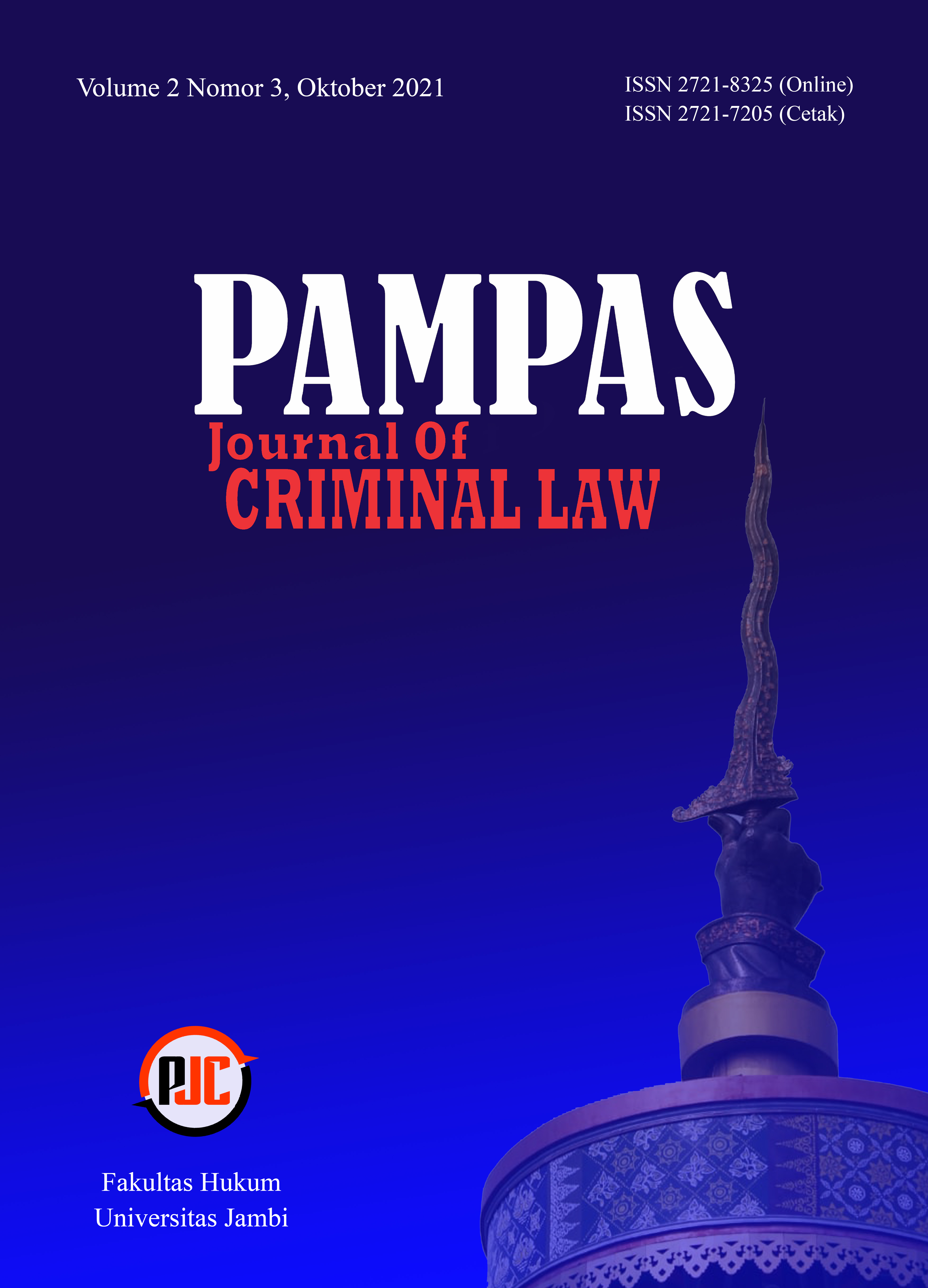Pengaturan Transparansi Beneficial Ownership di Sektor Jasa Keuangan dalam Rangka Pencegahan dan Pemberantasan TPPU
DOI:
https://doi.org/10.22437/pampas.v2i3.14946Keywords:
Beneficial ownership, FATF, pemilik manfaat, TPPU, trAbstract
This article discusses two main issues, first how the beneficial ownership concept stipulated in the FATF recommendation is adopted in the financial services sector of anti-money laundering regulation. Second, how beneficial ownership transparency regulation can assist efforts in preventing and eradicating money laundering offenses. The research will look at the legal substance or doctrinal aspects of beneficial ownership reporting regulations in the anti-money laundering legal framework and program, then juxtaposed with Presidential Decree 13/2018 and its compliance with the standards set out in the recommendations of the FATF, considering that Indonesia actually adopted the FATF recommendation. The conclusion of this article is first, that the concept of beneficial ownership in the anti-money laundering regime in Indonesia has fully adopted the provisions and standards of the FATF recommendations, but only within the regulatory framework at the regulatory level, whereas at the laws and presidential regulations level regulate only part of it. Second, identification and transparency of beneficial ownership is a key factor in the prevention and eradication of money laundering offenses, both in relation to supervision and law enforcement in the context of recovering assets from proceeds of crime.
Â
ABSTRAK
Artikel ini membahas, pertama bagaimana konsep beneficial ownership (pemilik manfaat) yang diatur dalam rekomendasi FATF diadopsi dalam regulasi anti pencucian uang di sektor jasa keuangan di Indonesia. Kedua bagaimana pengaturan transparansi beneficial ownership membantu upaya pencegahan, pemberantasan TPPU di sektor jasa keuangan. Metode yang dipergunakan dalam artikel adalah yuridis normatif. Hasil dari artikel ini pertama, konsep beneficial ownership dalam rezim anti pencucian uang di Indonesia mengadopsi penuh ketentuan dan standar dari rekomendasi FATF namun hanya dalam kerangka regulasi tingkat peraturan regulator. Sementara level undang-undang, peraturan presiden, baru mengatur sebagian ketentuan FATF terkait beneficial ownership korporasi. Kedua, identifikasi dan transparansi beneficial ownership sebagai kunci Pencegahan dan pemberantasan TPPU, baik kaitannya dengan pengawasan maupun penegakan hukum dalam rangka pemulihan aset hasil tindak pidana.
Downloads
References
Dokumen Hukum
PBI Nomor 14/27/PBI/2012 tentang Penerapan Program Anti Pencucian Uang Dan Pencegahan Pendanaan Terorisme Bagi Bank Umum.
PERMA No 13 Tahun 2016 tentang Tata Cara Penanganan Tindak Pidana Oleh Korporasi.
Perpres No 13 Tahun 2018 tentang Penerapan Prinsip Mengenali Pemilik Manfaat Dari Korporasi Dalam Rangka Pencegahan Dan Pemberantasan Tindak Pidana Pencucian Uang Dan Tindak Pidana Pendanaan Terorisme.
POJK Nomor 23 /POJK.01/2019 Tentang Perubahan Atas Peraturan Otoritas Jasa Keuangan Nomor 12/POJK.01/2017 Tentang Penerapan Program Anti Pencucian Uang Dan Pencegahan Pendanaan Terorisme Di Sektor Jasa Keuangan.
Putusan PN Semarang, Nomor 47/PIDSUS-TPK/2019/PN SMG.
Republik Indonesia. Undang-Undang Tentang Pencegahan dan Pemberantasan Tindak Pidana Pencucian Uang, Undang-Undang Nomor 8 Tahun 2010. LNRI Tahun 2010 Nomor 122, TLNRI Nomor 5164.
Buku
Brun, Jean-Pierre, Anastasia Sotiropoulou, et al. Asset Recovery Handbook a Guide for Practitioners, Wahington DC: World Bank Publications, Second Edition, 2007.
FATF. FATF Guidance: Transparency and Beneficial Ownership, Paris: FATF, 2014.
FATF. International Standards On Combating Money Laundering and The Financing of Terrorism & Proliferation: The FATF Recommendations, 2012, Updated October 2020, Paris: FATF/OECD, 2012.
Forstater, Maya. Beneficial Openess: Weighing The Costs and Benefits of Financial Transparency, Norway: CMI, 2017.
Framework and Views from the Accountancy Profession, Canada: IFAC/CPA,2020.
Hagman, Fredrik. Beneficial Ownership - a concept in identity crisis, Swedia: Faculty of Law, Lund University, 2017.
International Federation of Accountants (IFAC) and Chartered Professional Accountants of Canada (CPA Canada), Approaches to Beneficial Ownership Transparency: The Global Framework and Views from the Accountancy Profession, Canada: IFAC/CPA,2020.
Lexis Nexis, World The Hidden World of Beneficial Ownership a Due Diligence Challenge, Lexis Nexsis, 2017.
Novariza, Iman Santoso, et al., Panduan Memahami Tipologi Pencucian Uang Dari Korupsi dan Strategi Penanganannya, Jakarta: KPK, AIPJ, Sustain, 2020.
Piper, Jason, Alex Metcalfe. Economic Crime in a Digital Age, United Kingdom: ACCA and EY, 2020.
PPATK. Indonesia National Risk Assesment 2015, Jakarta: PPATK, 2016.
Reinhard-DeRoo, Matthias. Beneficial Ownership: Basic and Federal Indian Law Aspects of a Concept, Swistzerland: Spinger, 2014.
Schott, Paul Allan. Reference Guide toAnti-Money Laundering and Combating the Financing of Terrorism, Washington DC: The Word Bank, Second Edition and Supplement on Special Recommendation IX, 2006.
STaR. G20 High-Level Principles on Beneficial Ownership Transparency, Australia: sTAR, 2014.
Tim Penyusun SRA, Penilaian Risiko TPPU dan TPPT di Sektor Jasa Keuangan Tahun 2019 OJK, Jakarta: PPATK/OJK, 2017.
Willebois, Emile van der Does de, Emily M. Halter, et al., The Puppet Masters, How the Corrupt Use Legal Structures to Hide Stolen Assets and What to Do About It, Washington DC: sTAR / the Word Bank/UNODC, 2011.
Jurnal
Salle, Agustinus. “Makna Transparansi Dalam Pengelolaan Keuangan Daerahâ€, Jurnal Kajian Ekonomi dan Keuangan Daerah, Universitas Cendrawasih, Jayapura (2017).
Purwijanti, Kusrini dan Iman Prihandono. “Pengaturan Karakteristik Beneficiary Owner di Indonesiaâ€, Surabaya: Notaire: Vol. 1 No. 1, 2018.
M.L.L. van Bladel. “Commentary on: OECD Model tax convention: Revised proposals concerning the meaning of “Beneficial Owner†in articles 10, 11 and 12â€, Netherland, (2012).
Internet
Agustiyanti. "Arus Dana Triliunan Rupiah Transaksi Mencurigakan di Perbankan RI", https://katadata.co.id/agustiyanti/finansial/5f6a1154e6385/arus-dana-triliunan-rupiah-transaksi-mencurigakan-di-perbankan-ri, 22/9/2020.
Alecci, Scilla. “FinCEN Files investigations from across Asiaâ€, ICIJ, https://www.icij.org/investigations/fincen-files/fincen-files-investigations-from-across-asia/, 24/09/2020.
OECD. “Disclosure of Beneficial Ownership and Control in Indonesia: Legislative and Regulatory Policy Options for Sustainable Capital Marketsâ€, https://www.oecd-ilibrary.org/governance/disclosure-of-beneficial-ownership-and-control-in-indonesia_5k43m4pdrj36-en, 2011.
OECD. “OECD-Indonesia Workshop on Disclosure of Beneficial Ownership and Controlâ€, https://www.oecd.org/corporate/oecd-indonesiaworkshopondisclosureofbeneficial ownership andcontrol.htm, 2012.
PPATK. “LTKM Apr 2019 s.d. Apr 2020â€, https://www.ppatk.go.id/statistik_laporan/read/9/ltkm-apr-2019-sd-apr-2020.html, 8/5/2007.
PPATK. “Siaran Pers : Komite TPPU: Satukan Tekad Hadapai Mutual Evaluation Review FATFâ€, https://www.ppatk.go.id/siaran_pers/read/1096/siaran-pers-komite-tppu-satukan-tekad-hadapai-mutual-evaluation-review-fatf.html, 24/9/2020.
Putra, Idris Rusadi. “FinCEN Ungkap 496 Transaksi Janggal Senilai Rp7,41 Triliun di 19 Bank Indonesiaâ€,https://www.merdeka.com/uang/fincen-ungkap-496-transaksi-janggal-senilai-rp741-triliun-di-19-bank-indonesia.html, 22/9/2020.
STaR. “Beneficial Ownership Guidesâ€, https://star.worldbank.org/content/beneficial-ownership-guides, 2017.
Downloads
Published
How to Cite
Issue
Section
License
Copyright (c) 2021 Novariza Novariza

This work is licensed under a Creative Commons Attribution 4.0 International License.
This work is licensed under Creative Commons Attribution 4.0 International License. All writings published in this journal are personal views of the authors and do not represent the views of this journal and the author's affiliated institutions. Author(s) retain copyrights under the licence of Creative Commons 4.0 International (CC BY 4.0).



.png)





